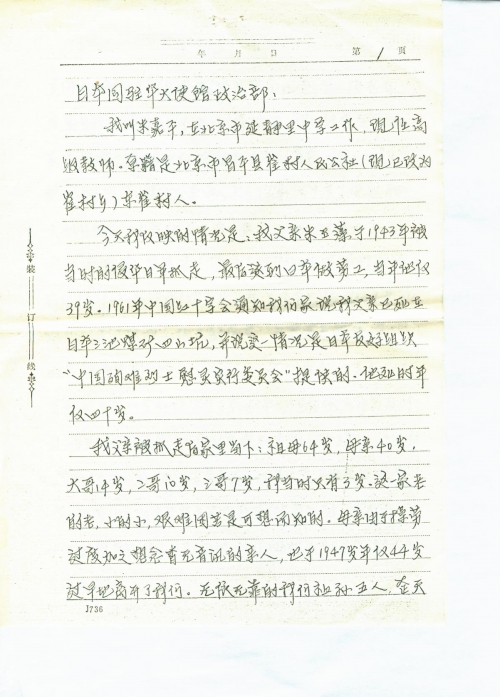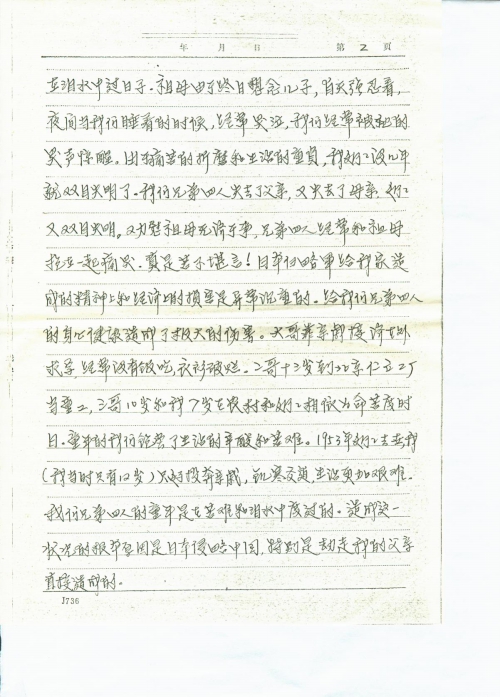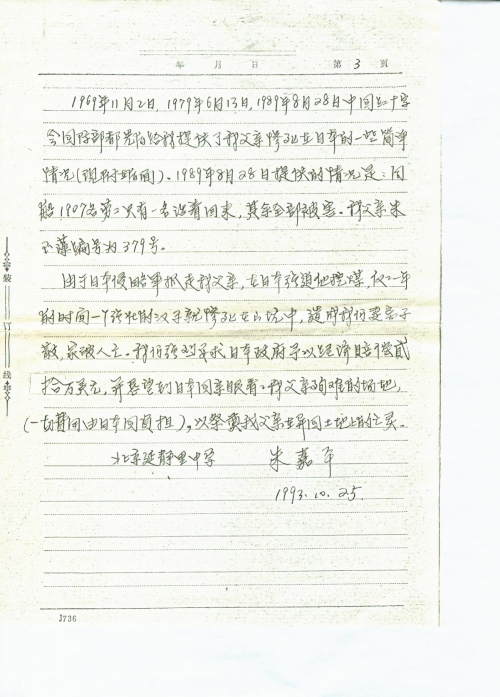Date of letter:1993-10-25
Address of author:Beijing City
Date of event:1943
Location of event:Not mentioned
Name of author:Zhu Jiaping
Name(s) of victim(s):Zhu Yuzao(Zhu Jiaping‘s father)
Type of atrocity:Slave Laborers(SL)
Other details:My father Zhu Yuzao was captured by the Japanese Army in 1943, and sent to Japan to work as Slave Laborers. In 1961 the Red Cross Society informed us that my father died in the Miike Coal Mine in Japan. Among 1,907 Slave Laborerss who went there with him, only one returned alive, others all died. My father’s number was 379. Note: The envelope is missing
To the Political Department of the Japanese Embassy in China,
I am Zhu Jiaping and work at the Middle School of Yanjingli, Beijing as a senior teacher. I was born in Dongcui Village, People’s Commune of Cuicun (now Cuicun), Changping, Beijing.
The fact I am reporting is that in 1943, my then 39-year-old father Zhu Yuzao was taken away by the then invading Japanese army and sent to Japan as a slave labor. In 1961, the Red Cross Society of China informed my family that my father had died in Yotsuyama Pit, Miike Coal Mine, Japan and that the information was provided by the Chinese Martyrs Implementation Committee, a Japanese friendship organization. My father died at the age of only 40.
After my father was captured, there was only my 64-year-old grandmother, 40-year-old mother, 14-year-old oldest brother, 10-year-old second oldest brother, 7-year-old third oldest brother and only 3-year-old me in my family. As only the elderly and children were left, one can image how difficult our life was. Then in 1947, my mother died at the age of only 44 because she overworked and terribly missed my father whose whereabouts were unknown, leaving my grandmother and us children to struggle through tears. My grandmother resisted not to think of her son in the day time, but cried a lot at night after we fell asleep. We were often woken up by her crying. We tried to comfort her, but in vain. Several years later, due to the painful suffering and heavy life burden, my grandmother became blinded. Without a father or mother, we four brothers often held my blinded grandmother, crying together. Our suffering is indeed unspeakable! The invading Japanese army caused tremendous mental and economic damage to my family and great damage to the physical and mental health of us four brothers. My oldest brother studied outside my hometown with the help of relatives. He often had no meals to eat and dressed in rags. My second oldest brother became a child labor at age 13 with Renli Factory in Beijing. My 10-year-old third eldest brother and 7-year-old me lived with my grandmother in the countryside. We experienced the bitterness and suffering of life through childhood. In 1953, my grandmother died. I (then only 12) had to seek shelter from relatives. I suffered from cold and hunger. Life became even harder for me. We four brothers lived our childhood in pain and tears. All of this is fundamentally caused by Japan’s war of aggression against China, especially the Japanese army’s capturing my father.
The Red Cross Society of China provided some basic information (attached below) about my father’s tragic death in Japan on November 2, 1969, June 13, 1979 and August 28, 1989 respectively. The information it provided on August 28, 1989 is that among the 1907 slave labors, including my father, who were sent to Japan on the same ship, only one survived and my father’s number was 379.
The invading Japanese army took away my father and forced him to dig coal in Japan, causing him, a strong man, to die tragically in a mountain pit in only one year and tearing my family apart. We strongly demand the Japanese government to compensate us USD 200,000 and satisfy our desire to look at the place where my father died (All costs shall be undertaken by Japan) to comfort his dead soul in the foreign land.
Zhu Jiaping, Middle School of Yanjingli, Beijing
October 25, 1993
















